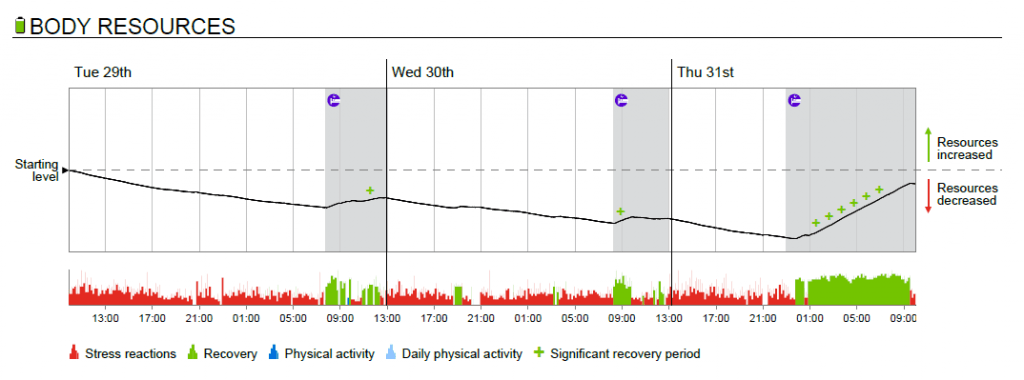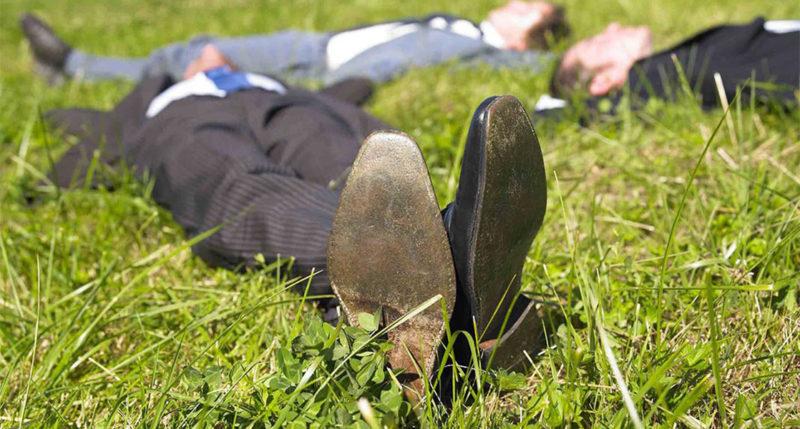
Shift work, night shifts and irregular working hours can represent significant health risks for employees. Sleep deprivation and sleeping disorders are common risk factors in shift workers (Härmä & Sallinen 2008). Shift workers for example tend to get into more accidents than workers with regular daytime working hours. In addition, shift workers are at increased risk for stomach ulcers, coronary heart disease (risk increased by 40%), thrombosis, breast cancer and reproductive disorders. Shift work may also be a risk factor in cause adult-onset diabetes and colonic cancer. In addition to the physical risk factors, shift work also sets a challenge to maintaining social relationships and hobbies, since a shift worker’s schedule is often so different. (Finnish Institute of Occupational Health 2014.)
Firstbeat Lifestyle Assessment database suggests that especially during the night’s sleep a shift worker’s recovery is significantly reduced. Sleep is often too short and share of recovery is decreased.

Firstbeat night shift of a 50-year-old man. He sleeps for a couple of hours before the shift but falling asleep is challenging. Lifestyle Assessment shows that the person is not recovering during naps. After a night shift he sleeps for five hours but even then recovery is only moderate. Share of recovery during the whole day is only 10%, whereas the recommended value is over 30%.

The resources graph of the 50-year-old man shows that resources are running dry during a night shift. He sleeps for up to 11 hours during his day off. Long good quality night sleep replenishes the resources almost back to the starting point.
In shift work the importance of healthy lifestyle choices should be emphasized. For example alcohol consumption, unhealthy eating habits and poor aerobic fitness may ruin recovery and slow down the replenishment of resources.It is important for a shift worker to get enough sleep, especially during the days off from work, in order to replenish their resources. The more sleep deprived they get, the more important it is to sleep even more than normally during the off days. The day after the night shift should be focused on activities that promote recovery such as relaxation exercises, physical activity with light intensity and other activities that do not stress the already exhausted body.

A 33-year-old man’s busy day at work. This combined with the three beers he had in the evening weakens the night time recovery.
Sufficient amount of sleep, healthy nutrition, regular physical activity and minor use of intoxicants can enhance recovery remarkably.

33-year-old man’s night shift. Before the night shift he goes for a short run and during the shift he eats healthy snacks every three hours and drinks enough. Healthy choices enable recovery during the night shift.
The choices made during night shifts can have a major impact on recovery. Regular nutrition, sufficient hydration and taking breaks effect not only in your vitality but also the Lifestyle Assessment results. When the working days do not take all your energy, you have more resources left to spend on other areas of life.
Did you know that even small changes could help you to recover more and lower your stress levels?
You might also be interested in

What is Presenteeism? And How Can We Fix the Multi-billion-pound Problem?
Paying proper attention to the well-being of staff will lead to a better working environment and happier, more productive employees.

The Tissue Box Psychologist: What Does Your First Reaction to Getting Sick Say About You?
Cold and flu season are knocking on the door once again. That means now is the perfect time to look deep and uncover what your reaction to falling under the weather says about you.

Work Hard, Play Hard, Rest Even Harder
Employees are companies’ most valuable asset, so their well-being should be priority number one. We need to act to change the tune of how Britons work.



